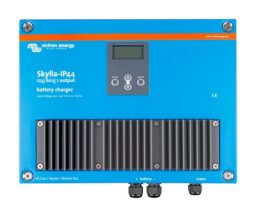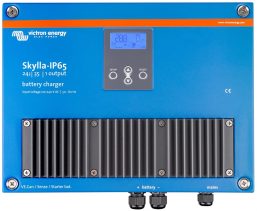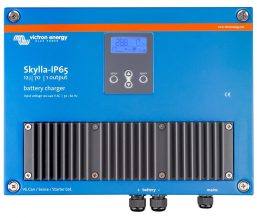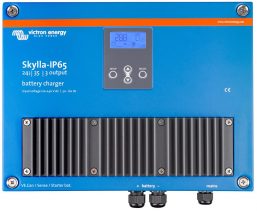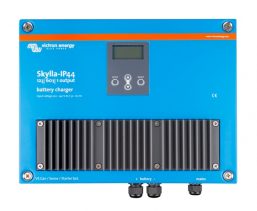Victron Skylla-IP65 battery chargers:
A powerful, waterproof and intelligent battery charger with a 7-stage adaptive charge algorithm, suitable for a wide range of battery types and chemistries featuring a dedicated Lithium-ion charge algorithm.
The wide range universal input voltage adds flexibility to the installation, the charger will maintain its full output power no matter where it is located in the world.
The IP65 rating makes this charger especially suitable for marine, mobile, and industrial applications and it can withstand the rigors of an adverse environment: heat, humidity and salt air.
Both models are available in two versions:
– 3 full rated outputs
– 1 full rated output together with an isolated 3A trickle charge output for a starter battery.
Models:
12V/70A & 24V/35A
Features:
Skylla-IP65 (1+1): two outputs to charge 2 battery banks- The Skylla-IP65 (1+1) features 2 isolated outputs. The second output, limited to approximately 3 A and with a slightly lower output voltage, is intended to top up a starter battery.
Skylla-IP65 (3): three full current outputs to charge 3 battery banks- The Skylla-IP65 (3) features 3 isolated outputs. All outputs can supply the full rated output current.
IP65 protection- Steel epoxy powder coated case. Withstands the rigors of an adverse environment: heat, humidity and salt air. Circuit boards are protected with an acrylic coating for maximum corrosion resistance. Temperature sensors ensure that power components will always operate within specified limits, if needed by automatic reduction of output current under extreme environmental conditions.
LCD display- For status monitoring and to easily adapt the charge algorithm to a particular battery and its conditions of use.
CAN-bus interface (NMEA2000)- To connect to a CAN-bus network, to a Skylla-i Control panel or to the Color Control digital display.
Synchronised parallel operation- Several chargers can be connected in parallel and synchronised with help of the CAN-bus interface. This is achieved by simply interconnecting the chargers with RJ45 UTP-cables.
The right amount of charge for a lead-acid battery: variable absorption time- When only shallow discharges occur the absorption time is kept short in order to prevent overcharging of the battery. After a deep discharge the absorption time is automatically increased to make sure that the battery is completely recharged.
Preventing damage due to excessive gassing: the BatterySafe mode- If, in order to quickly charge a battery, a high charge current in combination with a high absorption voltage has been chosen, the Skylla-IP65 will prevent damage due to excessive gassing by automatically limiting the rate of voltage increase once the gassing voltage has been reached.
Less maintenance and aging when the battery is not in use: the Storage mode- The Storage mode kicks in whenever the battery has not been subjected to discharge during 24 hours. In the storage mode float voltage is reduced to 2,2 V/cell (26,4 V for 24 V battery) to minimise gassing and corrosion of the positive plates. Once a week the voltage is raised back to the absorption level to ‘refresh’ the battery. This feature prevents stratification of the electrolyte and sulphation, a major cause of early battery failure.
To increase battery life: temperature compensation- Every Skylla-IP65 comes with a battery temperature sensor. When connected, charge voltage will automatically decrease with increasing battery temperature. This feature is especially recommended for sealed lead-acid batteries and/or when important fluctuations of battery temperature are expected.
Battery voltage sense- In order to compensate for voltage loss due to cable resistance, the Skylla-IP65 is provided with a voltage sense facility so that the battery always receives the correct charge voltage.
Use as a power supply- As a result of the excellent control circuit, the Skylla-IP65 can be used as a power supply with perfectly stabilized output voltage if batteries or large buffer capacitors are not available.
Li-Ion (LiFePO4) ready- Simple charger on-off control can be implemented by connecting a relay or open collector opto coupler output from a Li-Ion BMS to the remote control port of the charger. Alternatively complete control of voltage and current can be achieved by connecting to the CAN-bus port.





